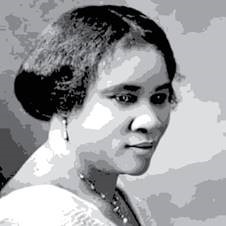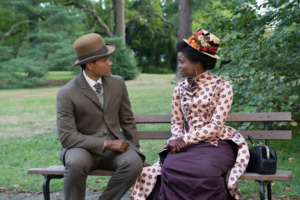
In honor of Black History Month, we, the Assistant Town Historians, wanted to do a piece highlighting the contributions of African Americans.
Power has been defined in many ways. At times power is used as a synonym for capability or ability to act. At other times it’s defined as being in control of one’s own destiny. In its harshest and most Machiavellian definition, power can be described as the ability to get others to do what you want them to do. However one defines power, one cannot deny that wealth and humility can both help a person achieve it.
Below are two stories – one of wealth and one of humility – that show how two highly influential African Americans gained both personal and political power.
Madam C.J. Walker, the first African American millionairess, was born on December 23, 1867 on a cotton plantation close to Delta, Louisiana. Her parents were Minerva and Owen Breedlove, two recently freed slaves. Although she is known as Madame C.J. Walker, her first name is actually Sarah. The name Madame C.J Walker comes from her marriage to her second husband Charles Walker. Her mother died in 1874 and her father died the next year. When her father died, seven year old Sarah was sent to live with her older sister and brother-in-law. They moved to Vicksburg Mississippi in 1877. However, Sarah’s life there was not a happy one because her brother-in-law, Jesse Powell, was highly abusive.
In 1882, at the age of fourteen, she married Moses McWilliams and moved in with him. In 1887, Moses died and she moved to St. Louis, Missouri. There she attended public school at night while she worked as a washerwoman during the day, earning $1.50 a day. It was in school that she met her second husband Charles J. Walker. It was also while in school in 1890, that she developed a rare scalp condition that caused her to lose a lot of her hair. She used a variety of home remedies and store bought cosmetics to try to treat the disease but nothing worked. So she began developing her own hair care products which worked. This inspired her to develop a whole line of cosmetic and medicinal hair care supplies and this was how she made her millions.
In 1905, she and her husband traveled around the country promoting her products. Three years later, her new found business was going so well that she used some of the profits to start a beauty school in Pittsburgh, Pennsylvania. They decided to move the company to Indianapolis, Indiana. At this point the Madame C. J. Walker Company was already making several million dollars so, they used some of the profits to finance the construction of a YMCA in the city of Indianapolis. Madame C.J. Walker’s life is proof of the saying, “Necessity is the mother of invention.”
In 1913, she and Charles divorced. After spending some time abroad in Latin America, she moved to Harlem in order to use her wealth to help improve the lives of other African Americans. She founded several charities to do this. In 1918, she moved to Greenburgh’s village of Irvington on the Hudson and commissioned a famous architect to build a large estate which she called Villa Lewaro. Today her estate is on the National Register of Historic Places. It was here at her home, that on May 25, 1919, at age 51 Madame C.J Walker passed away. While, as Madame C.J Walker’s story shows, wealth is one pathway to power, it is not the only such pathway. Another pathway to power is through humility.
Humility-Martin Luther King Jr.

Martin Luther King Jr. was a great speaker, great humanitarian, and is widely acknowledged as the most influential civil rights leader in American History. Yet few people today can say that they actually saw and heard him directly. One who can is Professor Sheldon Malev, a professor of psychology at Westchester Community College. Now 80 the professor still vividly recalls when, at age 28, he heard Martin Luther King Jr. speak.
It was October 25, 1967, and at that time I was unaware of the historical significance or the lifetime effect that Dr. King’s speech would have on me. Furthermore, none of us in attendance that day could possibly know that this prominent speaker would be assassinated in less than 6 months (April 4, 1968), at the age of 38. Nor did any of us know that his birthday would eventually become a national holiday to commemorate his achievements. On that day I was a young, full-time instructor of psychology at Fairleigh Dickinson, 10 years younger than the speaker. I knew very little about him, and I had come to the meeting to hear what he had to say, knowing only that he had been campaigning for civil-rights for African-Americans, and had often been in the news. (Malev, 2019, p.1).
At that time, Prof. Malev was very active in protests against the Vietnam War, so what resonated with him most was how Martin Luther King Jr. compared then President Lyndon Johnson’s handling of the Vietnam War to President Kennedy’s handling of the Bay of Pigs Invasion. King compared the two because he considered both the Bay of Pigs Invasion and the Vietnam War to be terrible mistakes. Kennedy admitted that the invasion was a mistake and apologized for it, whereas, in contrast, Johnson did neither. This comparison awed the young Prof. Malev, who was impressed with King’s skill as a speaker, his intelligence, his compassion and his integrity. He then listened as King as stressed that humility was a key virtue for good leaders to have, and how admitting ones mistakes is an essential part of being humble.
King then used the Kennedy-Johnson comparison to lay out three basic principles as to how all people, but especially good humble leaders, should deal with their mistakes. King said that following in Kennedy’s and NOT Johnson’s example people should:
- Realize and recognize their mistakes.
- Admit their mistakes.
- Try to correct their mistakes (Malev, 2019, p 2)
In conclusion, power can be defined in many ways. But however one defines power it is certain that both wealth and humility are means to achieving it, especially if one belongs to an often marginalized group such as African Americans. The story of C.J Walker displays power through wealth and the story of Martin Luther King Jr. shows power through humility.
Martin Luther King Jr.’s humility is what enabled him to spread his message of diversity and inclusion of people of all races, religious creeds, and economic backgrounds, which is truly wealth for the mind and soul. It is this kind of wealth which brings forth the best in us all.






